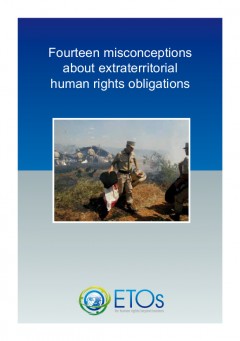
By Rolf Künnemann
The ETO Consortium, currently hosted by FIAN International, has put together this brochure with some legal and doctrinal misunderstandings that not only weaken the power of human rights, but also reduce the States' obligations to protect human rights.
This publication titled "The Fourteen Misconceptions About Extraterritorial Human Rights Obligations" refers to the misbeliefs that are sometimes encountered when discussing extraterritorial obligations in the area of economic, social and cultural rights.
On the basis of its mandate, the ETO Consortium deals with economic, social and cultural rights and uses the Maastricht Principles on States’ extraterritorial obligations as its key term of reference. Just as the Maastricht Principles carry the spirit of indivisibility of human rights, so do the responses to these fourteen misconceptions. They are applicable to extraterritorial obligations related to human rights in general.
Introduction
Human rights are the foundation of modern international law. In our days international and transnational economic and political decisions deeply affect the wellbeing of people far away from the respective decision makers. Over the past 20 years some areas of international law have developed – often against broad protests of civil society activists - that are in conflict with human rights. For states – and the human rights community - to address these legal and political concerns, some legal and doctrinal misunderstandings have to be tackled that otherwise curtail the powers of human rights – one of them the attempted reduction of states’ obligations to territory.
The following fourteen misconceptions are sometimes encountered when discussing extraterritorial obligations in the area of economic, social and cultural rights (ETOs). they are not the only ones. nevertheless they are perhaps the most frequent questions coming up in the context of ETOs.
There is also considerable urgency to strengthen ETOs and implement the primacy of human rights – in the middle of multiple crises. the ETO Consortium, a network of more than 80 CSOs and academics, has made this its task. The consortium also deals – in another publication - with “twelve reasons to strengthen etos”.
The ETO Consortium deals with economic, social and cultural rights and uses the Maastricht Principles on states’ extraterritorial obligations in this area as its key term of reference. Just as the Maastricht Principles carry the spirit of indivisibility of human rights, so do the responses to these fourteen misconceptions. They are applicable to extraterritorial obligations related to human rights in general and this is how they should be read.
Although published by the ETO Consortium, the responses to these fourteen misconceptions do not reflect a position of the Consortium or any of its members. The responsibility is with the author. He tried to capture some of the discussions inside and outside the ETO Consortium. The Maastricht Principles provide the main terms of reference. The legal commentary to these principles is recommended reading for all those who seek legal detail going beyond the responses provided in this little publication.
